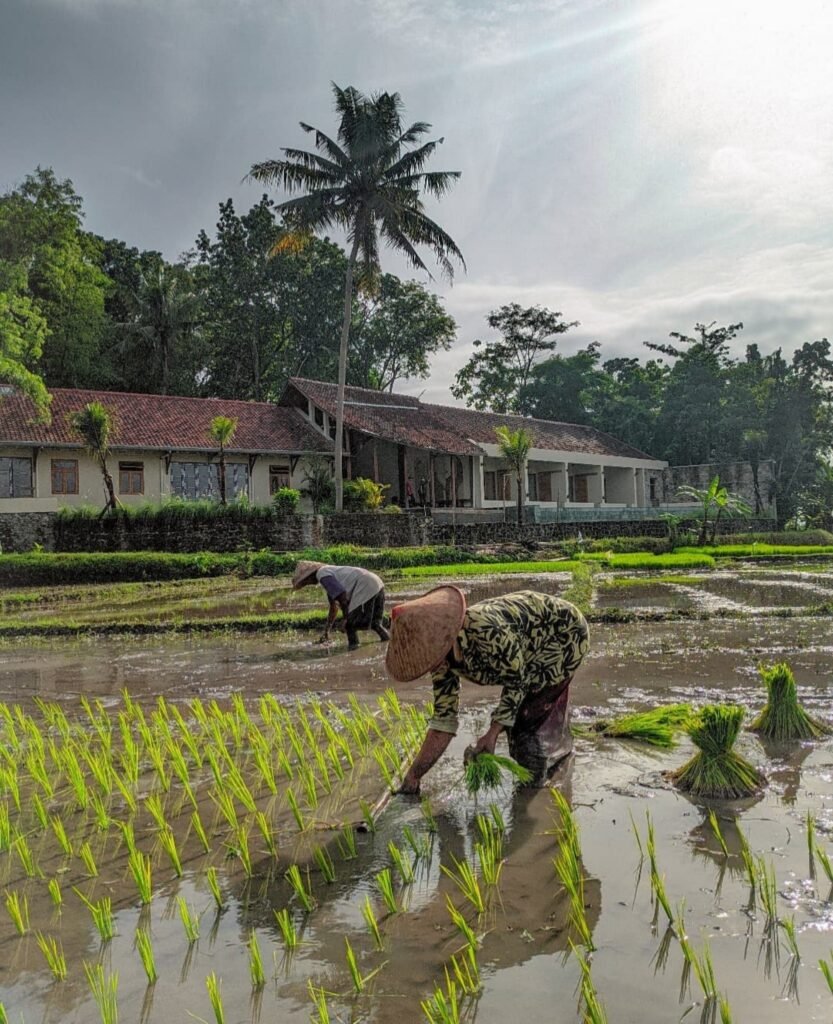Gardening and rice planting in Flores
Gardening and Rice Planting in Flores-Flores, an island located in Eastern Indonesia, is characterized by a unique tropical climate that significantly influences its agricultural viability, particularly for gardening and rice planting. The island experiences a warm climate, with average temperatures ranging from 24°C to 32°C throughout the year. This stable temperature range combined with abundant sunlight creates an ideal environment for a variety of crops. The tropical climate ensures a long growing season, which can be advantageous for gardeners and rice farmers looking to maximize their yields.
The island receives substantial rainfall, averaging between 1,500 to 3,000 millimeters annually. The rainy season typically spans from November to March, providing essential water resources for crops. These climatic conditions help to maintain moisture levels in the soil, which is crucial for the proper growth of rice and other plants. Understanding the distinct seasonal patterns is vital for farmers, as it allows them to optimize planting schedules and water management practices.
The soil composition in Floresis predominantly volcanic, which is rich in essential nutrients beneficial for agricultural activities. There are several soil types found on the island, including alluvial, clay, and sandy soils, each presenting its unique attributes. Volcanic soils, known for their fertility, enhance the growth potential of crops, supporting the agricultural endeavors of local communities. However, the properties of the soil can vary significantly across regions, underscoring the importance of farmers and gardeners assessing local soil conditions before cultivation.
Additionally, understanding local ecosystems is crucial for sustainable agriculture in Flores. Biodiversity plays a fundamental role in maintaining soil health and pest control. By observing and adapting to the intricate interactions within these ecosystems, farmers can implement agricultural practices that promote sustainability and resilience in their crops, ensuring productive gardening and successful rice farming for years to come.
Traditional and modern rice planting techniques
Rice planting in Flores reflects a rich tapestry of agricultural practices that blend traditional wisdom with contemporary innovations. The traditional techniques have been passed down through generations, enabling local farmers to cultivate rice sustainably while maintaining soil health and biodiversity. One common method involves the use of organic fertilizers, which are derived from natural materials such as compost, manure, and green manure crops. This approach not only improves soil fertility but also minimizes the reliance on synthetic chemicals, thus promoting a healthier ecosystem.
Manual planting techniques, a hallmark of traditional rice cultivation, require a labor-intensive approach where farmers transplant seedlings by hand. This method allows for greater care in the planting process, ensuring that each rice plant has the best chance of growing strong and healthy. Furthermore, traditional methods often incorporate diverse planting patterns that help manage pests and diseases naturally, reducing the need for chemical interventions.
On the other hand, modern innovations in rice planting have introduced several advancements aimed at increasing efficiency and crop yield. Mechanization has become more prevalent, with the use of rice planters and harvesters streamlining the planting and harvesting process. These machines dramatically reduce labor costs and time spent in the field, allowing farmers to allocate resources more effectively. Additionally, modern techniques often utilize hybrid rice varieties that are designed for higher productivity and resistance to climate-related stresses, such as drought or flooding.
While integrating these modern technologies offers numerous benefits, challenges persist. The transition from traditional practices to modern methods can sometimes disrupt the local agricultural landscape, affecting biodiversity and soil health. Furthermore, the financial investment required for machinery and hybrid seeds may not be feasible for all farmers. Thus, a balanced approach that harmonizes traditional and modern techniques is essential for sustainable rice farming on Flores. This integration can lead to improved crop yield while preserving the cultural heritage of local agricultural practices.
Gardening practices for self sufficiency in Flores
Gardening in Flores presents a unique opportunity for residents to cultivate their own food, while ensuring sustainable practices that benefit both their households and the environment. To maximize success in home gardens, it is essential to select crops that are well-suited to the region’s climate and soil conditions. Vegetables such as tomatoes, eggplants, and chilies thrive in Flores and can be easily integrated into home gardens. For those interested in expanding their options, incorporating local varieties of tubers and leafy greens can provide nutritional diversity and resilience against pests.
Another crucial aspect of successful gardening in Flores is utilizing companion planting. This method involves growing different crops in proximity to benefit one another. For example, planting basil alongside tomatoes can enhance flavor while also deterring certain pests. Marigolds, known for their pest-repelling properties, can be strategically interspersed throughout the garden to promote healthier growth. Creating this beneficial ecosystem can significantly improve crop yield and reduce the need for chemical interventions, thereby cultivating a healthier environment.
Sustainable pest management strategies are vital for maintaining garden health without relying heavily on synthetic pesticides. Integrated Pest Management (IPM) techniques, which include attracting beneficial insects, using natural repellents, and promoting crop diversity, can effectively mitigate pest issues. Encouraging birds and insects like ladybugs to inhabit the garden contributes to natural pest control and supports ecological balance. Furthermore, regularly rotating crops and adding organic matter to the soil can bolster soil health, ensuring it retains nutrients necessary for robust plant growth.
Overall, adopting these effective gardening practices can empower Florentines to achieve self-sufficiency. By carefully selecting crops, engaging in companion planting, and utilizing sustainable pest management, residents can create productive and environmentally friendly gardens that promote both food security and biodiversity.
The Importance of community and knowledge sharing
The significance of community in promoting sustainable agriculture practices on Flores cannot be overstated. A collaborative approach among local farmers plays a crucial role in shaping effective gardening and rice planting techniques, ultimately enhancing food security across the region. This collective effort fosters a sense of belonging and cooperation, wherein individuals share valuable insights, techniques, and experiences that are vital for improving agricultural productivity.
Knowledge sharing among farmers is essential for the development of adaptive practices that respond to the challenges posed by climate change and fluctuating market demands. By participating in community-driven initiatives, farmers can exchange ideas about organic gardening, pest control, crop rotation, and irrigation methods. These shared experiences not only promote better agricultural practices but also empower farmers to make informed decisions that can lead to sustainable farming outcomes.
Various local initiatives and workshops serve as platforms for collaboration and knowledge exchange in Flores. Organizations dedicated to sustainable agriculture often host training sessions, seminars, and field demonstrations, allowing community members to engage with experts and learn about innovative techniques. These gatherings foster a culture of continuous learning and adaptation, which is necessary for preserving traditional farming methods alongside modern advancements in agriculture.
Moreover, the establishment of informal networks and cooperatives plays a significant role in the exchange of resources. Farmers can combine their efforts to access larger markets, acquire necessary tools, and share seeds, thereby reducing individual costs and risks. Through these cooperative endeavors, the community strengthens its resilience against economic uncertainties while reinforcing their collective identity.
In conclusion, fostering a strong sense of community and encouraging knowledge sharing among farmers in Flores is vital for advancing sustainable agriculture. By collaborating and exchanging resources, local farmers can significantly enhance their gardening and rice planting practices, ultimately contributing to improved food security and community resilience.








